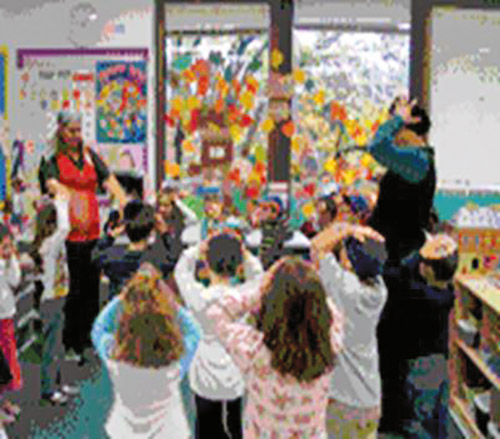
Yet another article was just released (by EJP) about the critical role Hebrew language learning plays in identity development, and yet most day schools have still not addressed this issue. There is so much research on language learning for students with a focus on speaking and comprehension. Numerous studies indicate that students experience cognitive benefits as a result of second language learning, particularly when the target language is so different from the native language, with a different alphabet and directionality. Research shows that learning a second language improves performance in other academic areas and enhances memory and other brain functions. All of these are excellent reasons for studying Hebrew.
“Hebrew is the essential connective thread to Jewish civilization, Jewish peoplehood, Israel and its people and to most Jewish literature. Hebrew provides a sense of belonging and familial connection, and offers access to the historical references and meanings conveyed in classical Jewish ideas, texts, constructs and memories. Hebrew competency is an essential element in understanding modern Israel and its people and culture.” —Rabbi Mitchel Malkus, head of school, Charles E. Smith Jewish Day School of Greater Washington, D.C.
Every language conveys feelings, nuances and the emotional domain that are unique to it. It is impossible to have a full appreciation for Hebrew texts and literature in translation. “Only the Hebrew language links us to the past, present and future of the Jewish people, and to a specific land. No other language—and Jews have spoken many Jewish languages throughout our history—bonds us to the soul of our history, textual tradition, people and the land of Israel more than Hebrew does.” [Malkus]
Hebrew enables students to be part of our history as a Jewish people. Hebrew is the historic national language of the Jewish people. It would seem obvious, therefore, that Jewish day schools would have more than a nominal interest in teaching and preserving Hebrew beyond reading, writing and translating religious texts. Too often we find that day schools do not follow through with any serious and rigorous program to ensure a true Ivrit B’Ivrit environment. The result is that graduates, even after 12 years in a day school, cannot converse comfortably in Hebrew nor have they been exposed to the treasures of Hebrew literature.
To be sure, some schools do strive for their students to achieve Hebrew mastery and fluency. This, however, is the exception, not the rule. That is the issue at hand.
In 2004, The Memorial Foundation For Jewish Culture provided key funding to develop and implement a preschool immersion program that guaranteed fluency prior to first grade when text study begins. They chose the Bergen County Jewish community for this experiment because of its numerous day schools, professional educational staff and serious Jewish commitment. It became known as Hebrew in America because it was to be a model that could be duplicated in other communities.
Additional funding was secured and a program emerged that trained teachers to teach Hebrew as a second language based on second-language acquisition skills developed by Dr. James Asher to teach Japanese to non-native speakers and based also on the work of Lifsa Schachter. There were three modules used for teachers on every level of fluency and comfort level; a Community of Learning was formed for all the teachers; training was provided to teachers; and there was buy-in by parents and schools. Not every Israeli is trained to teach Hebrew, but they proved to be the most vested and enthusiastic when they saw that there is a method that works. A Hebrew-speaking day camp was added, which amplified what was accomplished during the year. Ten schools finished the five-year cycle of training and in-service. Kindergarteners were helping older siblings with their Hebrew homework. The program was run by our federation’s Jewish Educational Services (which no longer exists).
Hebrew is the irreplaceable language of Jewish life and expression. It is at the core of Jewish values. Its existence is coterminous with that of the Jewish people, and the many layers of the language mirror the cultures in which Jews perpetuated Judaism. It was never merely a vehicle of communication, but part of the fabric and texture of Judaism. Words vibrate with religious meaning, moral values and literary associations. Torah and Hebrew are inseparable. Hebrew literacy is the key to Judaism, to joining the unending dialectic between sacred texts, between Jews of different ages and eras, between God and Israel. To know Judaism only in translation is, to quote Bialik, akin to kissing the bride through the veil.
The revival of Hebrew is as singular a feat as the creation of the Jewish state. Hebrew has been wholly transformed from an unwieldy classical medium of liturgy and learning into a modern Western language fit for the sensibilities of contemporary society. Diaspora Jews can little afford to remain as deaf to the sounds of Hebrew as they can ignore the fate of the Jewish state.
In a Jewish world of sundry and proliferating divisions, Hebrew must emerge as the common and unifying language of the Jewish people. The natural bonds of language and culture bind more firmly than those of abstruse ideological constructs. Jewish peoplehood is achieved by the transmission of our collective memory and culture, rooted in our common language, literature and values. Lacking a common language means we also lack a common vocabulary, not only of words, but of values, norms and ideals. This weakens and dilutes us as a people.
Thus, there are compelling national and ideological reasons for schools to undertake a comprehensive program for the propagation of Hebrew. The elevation of the Hebrew language must be a core value in our Jewish educational institutions. The sooner that children become proficient in Hebrew, the easier it becomes for them to access the literary legacy of the Jewish people. Hebrew will become a portal to Jewish culture instead of a mere tool to study religious and devotional texts, or a vehicle to order a meal in an Israeli restaurant.
Schools are in the business of creating educated Jews. The Hebrew language in all its variants from the Bible to the present—not just street Hebrew—is an essential tool for reading much of what Jewish culture has produced. But it is more than a tool. Without Hebrew there is no visceral, as distinct from intellectual connection to Jewish creativity across time and space.
Dr. Leora Isaacs from JESNA evaluated the program very enthusiastically and the feedback was universally positive for this groundbreaking endeavor. Unfortunately after the various grants ran out, the schools themselves were unwilling to continue funding the program, despite its success, and despite the desire for continuity from teachers and parents, and the willingness of JES to continue staffing the program.
Sic transit gloria! But it remains a model of what can still be accomplished if there is a will and a desire to do so.
It is vital for schools, families and funders to commit themselves to supporting research-based methods of Hebrew language instruction. And it does not hurt that students will be advancing their academics and brain functioning, too.
The full 26-page summary report outlining the techniques utilized is available upon request.
Rabbi Dr. Wallace Greene was the director of Jewish educational services for a decade and helped to create this program.













